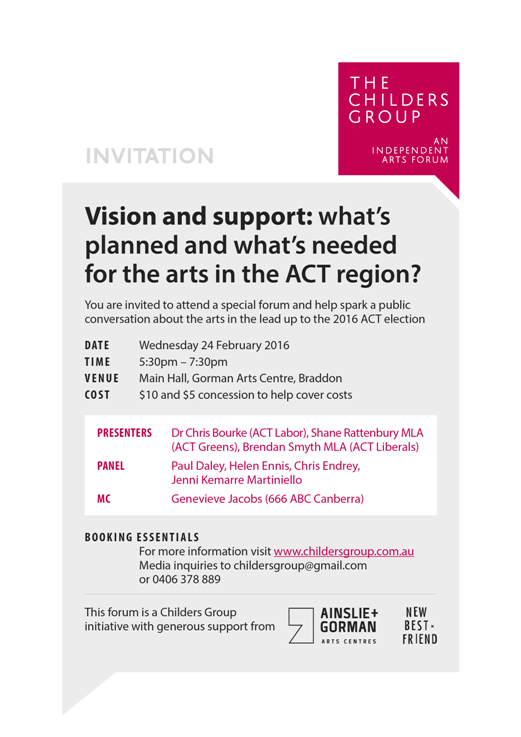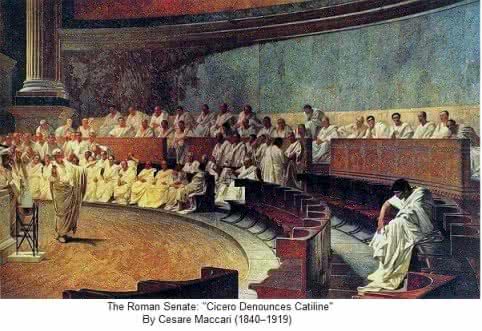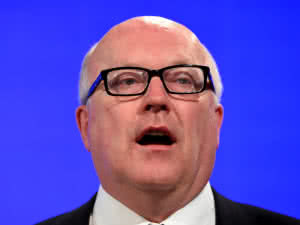Hi folks, Jack here.
Over the past few days there has been much discussion around whether unpaid mentorship models are appropriate in the context of content production for a major ACT event drawcard:
The Dark Side of Enlighten – Canberra Times
Enlighten artists unpaid but ecstatic about mentorship opportunity – The RiotACT
Government defends Enlighten’s unpaid mentoring program – Canberra Times
Alex Sloan chats with Chris Endrey and Adam Stankevicius on 666 afternoons – ABC
This has been a complex issue that has led to much discussion and debate, because it’s important. I’d like to try my best to articulate what I hope is a consensus position amongst the Childers Group.
I think the Childers Group’s role in this as impartial advocates – as much as we, a bunch of individuals, can be – is to consider whether there is legitimate room for improvement in how artists are engaged in the ACT. If there is, then let’s take this opportunity to drive some positive change, regardless of how we got here.
Firstly, I want to make it clear that it is the sincere belief of the Childers Group that all those involved in the discussion, heated though it may be at times, are acting in good faith with the best interests of the sector at heart.
It is absolutely vital that arts practitioners speak up for the value of the work that they do. We are important economic drivers for the territory and good art deserves to be paid art. It is a testament to the articulate, passionate and organised arts community that this issue has been brought so prominently into the public domain.
Likewise, artsACT have been consistent in communicating that the number of artists professionally engaged and amounts paid to them are key performance indicators for the health of the ACT arts sector, and a range of non-financial development opportunities such as mentorships are critical in advancing sustainable professional careers.
But while we have the measures, we are lacking a clear set of up-front principles to guide engagement with artists, particularly where there is a differential in the negotiating power between parties.
As a major employer of artists in the ACT, it is reasonable for the community to have expectations that the ACT government (and their contractors) has fair dealings with them.
These issues are not new and the question of whether unpaid internships, even willingly entered, are opportunities or exploitative exists outside the arts sector. While it would be inaccurate to describe the mentorships as voluntary work, the nation-leading team of downright legends at Volunteering ACT has produced an excellent guide for organisations with a simple checklist to determine whether a position or opportunity should be paid.
Questions in their guide include:
- Is the role critical to the overall successful function of the organisation?
- Is the role closely aligned to an industrial award?
- Is it likely that an employment relationship could exist?
- Is the role more than 16 hours per week?
- Does the non-effective performance of the role have any negative implications on the work of paid staff?
- Is this a position for which funding has been obtained, sought, or is available?
- Has this role ever been filled by a paid worker?
- Are similar roles filled by paid workers?
- Is this role normally a paid position in other organisations?
- Would a person reasonably expect remuneration for this work?
To this we could add:
- Does the work of the artist produce or materially contribute to financial benefit to others?
- Are these benefits for commercial or non-profit entities?
- If the role were not to be filled in an unpaid capacity, would a paid artist be sought to ensure the role was not left unfilled?
- Would the community expect the role to be paid?
We can say that the arts are different – if unpaid actors in a community production don’t show up the whole show falls over, for instance. But taken as a whole, if there are lots of “Yes” answers, I think a set of considerations like this could help to avoid situations in future where practice falls short of community expectation. I would love to see a resource like this available and used by the ACT Government, its contractors, and others considering engaging artists in the ACT.
In my sole opinion, part of the issue that we have seen this year is that Enlighten is a victim of its own success – it has grown very rapidly, and in the past couple of years been paired with an explosively popular commercial project in the form of the noodle markets. Given the shift in the economics of the event as a whole, it is reasonable to reconsider whether unpaid roles for projection artists, who are a primary attractor for the customers of these markets, remain appropriate. The question should at least be asked, there’s a problem if it’s not.
It’s worth saying also that it would be a real shame if artists in the ACT were denied opportunities to benefit from mentorships and national expertise in future contracts because it became all too difficult. We need to bring these skills in. Hopefully, this discussion will lead to the sector becoming more sustainable, not less.
What we would like to see is an active and continuing assessment of the nature of contracting artists to present at ACT events, and for the ACT Government as a major arts employer to find assurance that best practices are being followed.
Keep making good stuff, folks, and keep talking to each other. Galvanize.









